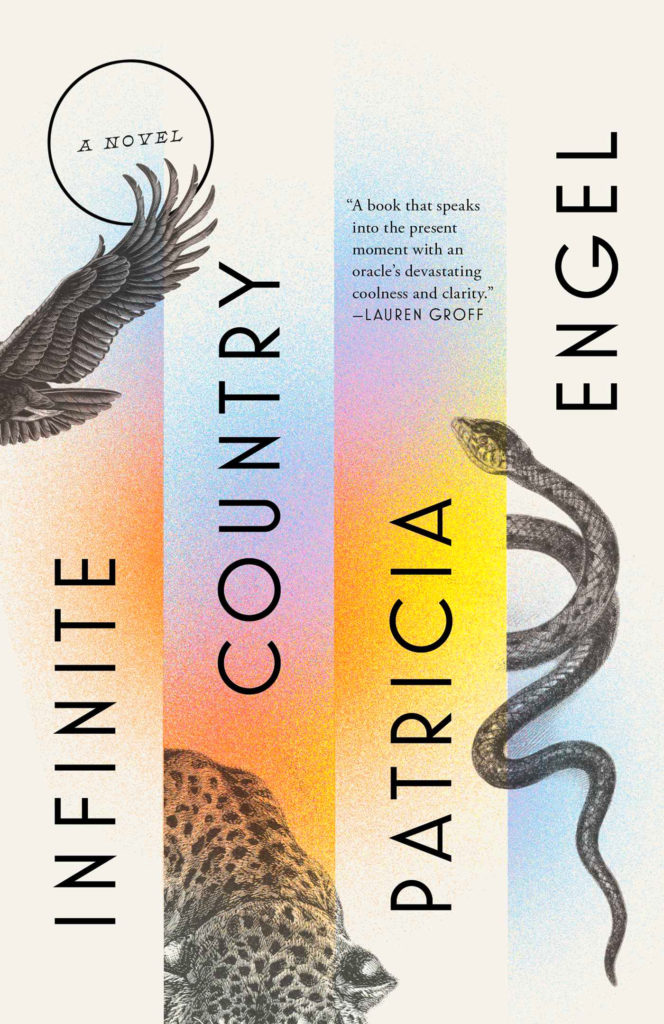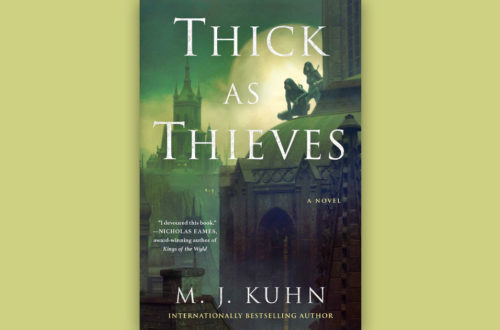Infinite Country by Patricia Engel follows a mixed-status Colombian family trying to build a better life for themselves. Elena and Mauro meet and fall in love as teens, their sweet romance a bright spot of hope against the backdrop of a brutal Bogotá. After having their first child, they set their sights on the United States for a better life, better wages, and better opportunities. They send money back to Elena’s mother in Colombia as their ideal situation is to work hard enough to secure ample funds for a more comfortable life in Colombia, but one thing leads to another, and they overstay their tourist visas. What started as a goal to build a better life in Colombia ends with a universal desire simply to thrive as one united family.

What was it about this country that kept everyone hostage to its fantasy?
Patricia Engel, Infinite Country
Infinite Country follows multiple viewpoints, opening with a chapter from Talia, Elena and Mauro’s youngest daughter. After one (arguably warranted) moment of violence, she’s racing against the clock as she escapes a reform school and makes her way to a flight into America that will reunite her with a mother and two siblings she hasn’t been with since she was a baby. Her story is thrilling, she’s an interesting character to follow, and the first chapter (and that first line!) completely pulled me in; however, the second chapter drops that thread immediately and picks up another character’s narrative several years back. It’s not until about halfway through the novel that you understand what’s going on with the narrative structure, and even then, it’s a little disorienting.
Karina, Elena and Mauro’s eldest daughter, is a dreamer in the political and literal sense. She crossed into the United States with her parents when she was a baby, and we understand it is she who has compiled the winding narratives that make this novel, some literally in the second-person as begrudging contributions only a younger brother might provide, her own in the first-person, and the rest of her family’s in the third-person. Karina’s deepest desire is for a day she feels safe enough with her family to pursue her dream to be a writer. The very existence of this book is hopeful since it implies Karina got her wish.
That said, I would’ve organized the narratives differently. Instead of seemingly random jumps into different narratives, I would have liked something a little more linear as I think it’d be easier to follow the intricacies of each person’s story. Because there was such a large gap between Talia’s first chapter and her next, I was wondering for a while what her significance was since that wild child didn’t seem to fit at all into Elena and Mauro’s blossoming romance. Moreover, since she is their youngest child, we don’t even meet her in their story for quite a while. I wish I hadn’t felt so distracted by it in the beginning of the novel. It made for a winding plot that was difficult to pick up for me, though I wonder if it was by design. When your entire life dwindles down to making ends meet and seeing one moment to the unpredictable next, perhaps it’s difficult to forecast future goals until the ground beneath your feet is a little steadier. We do see that as the children grow older, and Elena and Mauro reflect back on their connections to their own parents. Choices for this family become clearer, although I wonder if it’s because options to pursue happiness and security also become limited.
The ending of this novel, while satisfying, seems rushed. I wish we’d gotten a bit more on Mauro’s journey back to his family. The emotional despair he feels as a husband and father when he’s deported to Bogotá is relatable, whether or not a person is on a journey similar to his, but I wish we could’ve read more about his struggle to find himself and also his drive to find a way back to his family. Mauro tries his best, and I wanted to see him realize his family believes it sincerely. The ultimate question this novel explores is how to define the idea of home. Are our characters yearning to go back home to Colombia? Is America their new home? What about any one of the several locations within America as they moved around the country, or even the final home we see them in? Engel argues the idea of home is something far greater, whose shifting boundaries cannot be mapped, encompassing territories impossible to chart:
Maybe there is no nation or citizenry; they’re just territories mapped in place of family, in place of love.”
Patricia Engel, Infinite Country
Infinite Country gives voice to issues of immigration and displacement that are all too common in our world but are often banished to the shadows of national narratives. The novel provides glimpses into the daily concerns of mixed-status immigrant families and their divided lives while also emphasizing universal truths that will make you really care about this family because they’re really not that different from your own. This novel is impactful, hopeful, heartbreaking, and so real, with a poignant message that will be relevant for a long time.
Infinite Country at a glance
Book details
Title: Infinite Country
Author: Patricia Engel
Publisher: Avid Reader Press/Simon & Schuster
Release Date: March 2, 2021
Page Count: 208
Synopsis
An urgent and lyrical novel about a Colombian family fractured by deportation, offering an intimate perspective on an experience that so many have endured—and are enduring right now.
At the dawn of the new millennium, Colombia is a country devastated by half a century of violence. Elena and Mauro are teenagers when they meet, their blooming love an antidote to the mounting uncertainty of life in Bogotá. Once their first daughter is born, and facing grim economic prospects, they set their sights on the United States.
They travel to Houston and send earnings back to Elena’s mother, all the while weighing whether to risk overstaying their tourist visas or to return to Bogotá. As their family expands, and they move again and again, their decision to ignore their exit dates plunges the young family into the precariousness of undocumented status, the threat of discovery menacing a life already strained. When Mauro is deported, Elena, now tasked with caring for their three small children, makes a difficult choice that will ease her burdens but splinter the family even further.
Award-winning, internationally acclaimed author Patricia Engel, herself the daughter of Colombian immigrants and a dual citizen, gives voice to Mauro and Elena, as well as their children, Karina, Nando, and Talia—each one navigating a divided existence, weighing their allegiance to the past, the future, to one another, and to themselves. Rich with Bogotá urban life, steeped in Andean myth, and tense with the daily reality for the undocumented in America, Infinite Country is the story of two countries and one mixed-status family—for whom every triumph is stitched with regret and every dream pursued bears the weight of a dream deferred.



